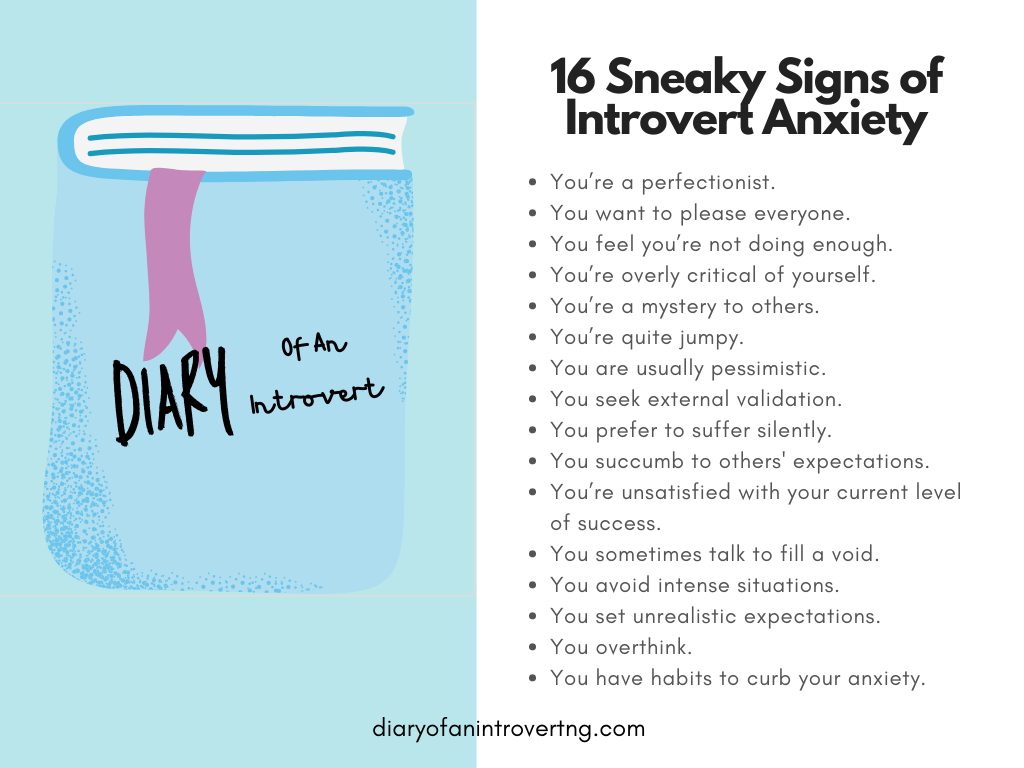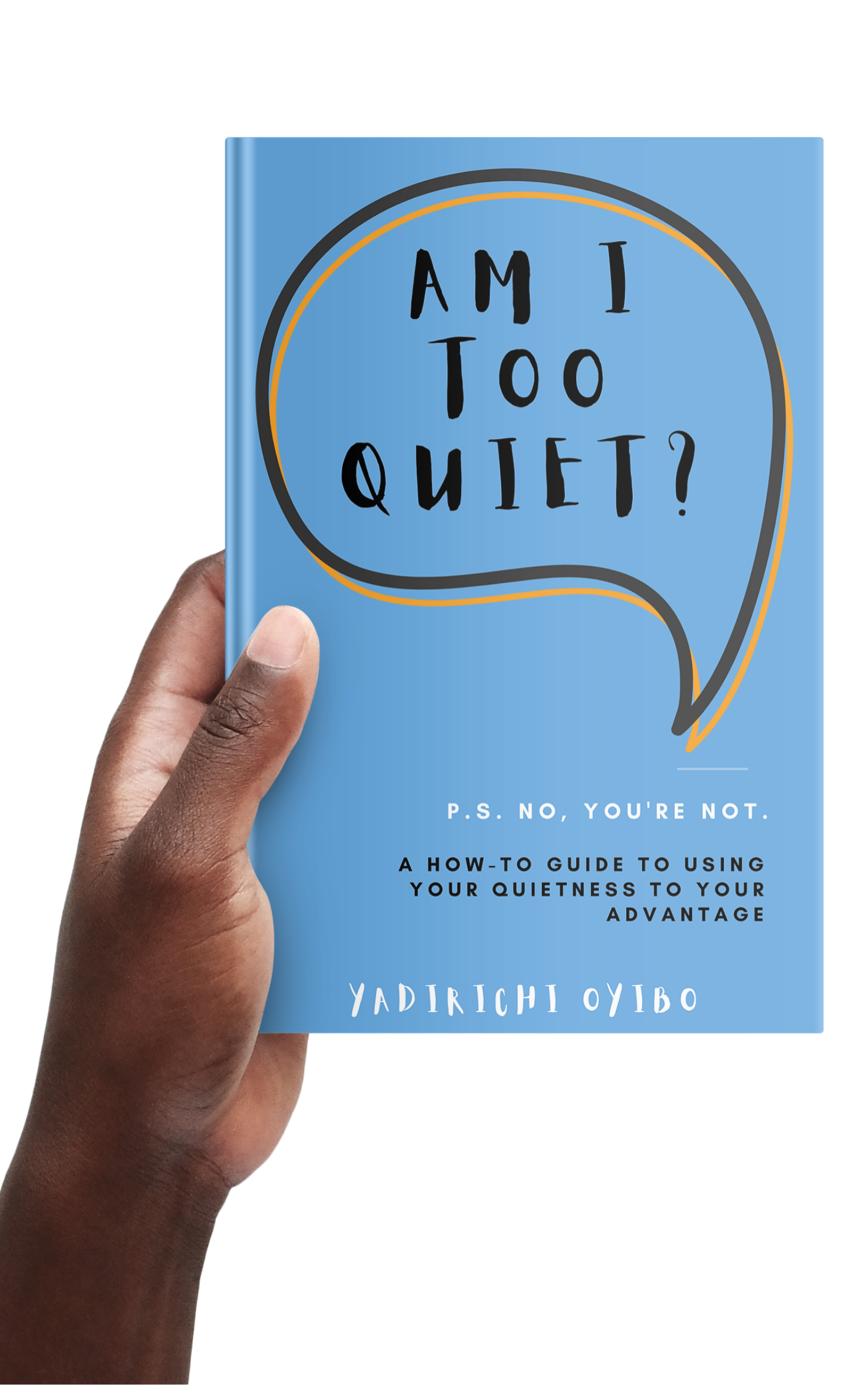16 Crazy Introvert Anxiety Signs That Will Shock You
Photo by Mathilde Langevin on Unsplash
Being an introvert doesn’t necessarily mean you have anxiety.
Even extroverts have their own share of anxious moments. However, statistically speaking, introverts tend to be more anxious than ambiverts or extroverts. This occurs because we’re more in our shells and tend to be concerned about letting ourselves out.
So, what is high-functioning anxiety? More so, what’s the difference between introversion and anxiety?
Introversion is a preference for minimally stimulating environments over clamorous ones. Whereas, being anxious is associated with several mental health conditions that come with excessive fear and worry about the future.
The anxious introvert meaning is someone overly concerned about the outcome of social situations, which frequently makes them refrain from engaging in any at all.
If an anxious introvert manages to have few social interactions, they end up worrying about how they acted or if they handled things well.
Just like general anxiety, having introvert anxiety can be apparent or subtle. In obvious scenarios, people with anxiety might struggle to breathe, sweat in uncomfortable situations, or ruminate over a bad encounter that happened years ago.
In other subdued situations, you might find yourself simply thinking about the worst possible outcome of a social outing. This is called high-functioning anxiety.
High-functioning anxiety is not an official mental health diagnosis but is something that most people can relate to. This type of anxiety is sneaky because people can have it but still be accomplishing their best.
Here are 16 sneaky signs of high-functioning anxiety in introverts, and some ways to curb it.
You’re a perfectionist.
No one dreads a failed plan more than the perfectionist type. This behavior is one of the sneaky signs of high-functioning anxiety.
You’re constantly planning, and you feel the need to have everything under control. According to psychologists, this method helps you deal with stress.
The more you feel in control of situations, the more you’re at ease with the future.
Introverts with anxiety can go as far as planning their conversation with another person or creating a to-do list for their entire week.
While these traits are great and help you become an overachiever, it’s necessary to give room for error and failure. You might have everything under control, but oftentimes, life doesn’t always go as planned.
The best way to ensure that your introvert anxiety only makes you productive and not apprehensive is to accommodate mishaps beforehand.
2. You want to please everyone.
Even though an anxious introvert dislikes certain social situations, they still find themselves trying to please others.
When you can’t decline a request because you’re afraid of being perceived negatively, then you have introvert anxiety.
Every high-functioning introvert needs to know their boundaries if they want to curb their anxiousness. Knowing what works for you in certain circumstances will give you confidence to simply say ‘no’. More so, it’ll reduce your worries.
A great way to accomplish this is through self-reflection. For example, I’ve realized that I can’t do any form of public speaking without knowing what to say first.
As an introvert with high-functioning anxiety, I get utterly scared when I’m unprepared and I need to speak to a large gathering.
Even though I’m keen on pleasing everyone to avoid being seen as inadequate, I recognize my limits and will comfortably decline such responsibilities if I’m not ready.
You can use this tactic if you’re in the same dilemma. Don’t try to get ahead of yourself, especially when trying to make others perceive you as something you’re not.
3. You feel you’re not doing enough.
Introvert anxiety can cause any quiet person to stay awake all night, trying to get the last bit of a puzzle in place. However, there’s this little voice in your head that tells you, “something might go wrong if you don’t get everything sorted out!”
Even after crossing off every item on your to-do list and accomplishing a long-awaited goal, you still feel like you’ve not done enough.
Being an anxious introvert helps you stay productive, but you should know when to draw the limit. If you always feel the need to be doing something or be effective, and it’s affecting your mental and physical health, then you need to take a break.
Not sleeping well is a sign that your anxiety is getting the best of you. According to research, trying to stay productive all the time is a tool anxious people use to distract themselves from their concerns. Therefore, learning how to bask in the sweetness of idle moments is quite essential.
Related: 16 Simple Things Introverts Love: A Peek at an Introvert’s Life
4. You’re overly critical of yourself.
If you look at yourself in the mirror and can only point out your flaws, then those are sneaky signs of high-functioning anxiety. Understand that you should be your number one cheerleader no matter the circumstance.
One of the ways that I tend to cope with my anxiety, especially when it comes to keeping appearances, is the ideology that I can’t see myself for a reason. Your eyes aren’t positioned to allow you to take constant note of your looks.
So, when you aren’t standing in front of one, you shouldn’t be bothered about what others notice about you. Likewise, the few minutes you spend in front of one should only be to appreciate yourself.
Another sign of anxious introversion is when you constantly beat yourself up for minor mistakes. Keep this in mind: you’re not perfect, and no one should expect you to be. If you’re always trying to be a better version of yourself without giving yourself a break, it will only trigger your introvert anxiety.
5. You’re a mystery to others.
Introverts are naturally introspective and keep to themselves. However, someone with introvert anxiety will be extra bothered about loosening up. They might fear opening up to the wrong person, or saying the wrong things and ultimately looking bad.
If you're always counting your words when with others, you might be displaying sneaky signs of high-functioning anxiety. This process will make you mysterious to the people around you. While this doesn’t pose a problem, it can interfere with people’s discernment of you.
Even though I wouldn’t advise any introvert to suddenly start interacting with everyone just to create the right impression, I’d say that spontaneous conversations can help with your anxious introversion. Your discussions don’t have to be planned all the time. Don’t be afraid to wing it whenever the need arises.
6. You’re quite jumpy.
Research shows that having an anxiety disorder can leave you startled most of the time. Your mind and body enter a stress response when you view something as a threat or an unpleasant surprise. Your sympathetic nervous system then stimulates your body and gets it ready for action, known as the fight-or-flight response (either to confront or flee from perceived danger).
However, with anxiety, every little action is amplified. If you mistakenly pour coffee on an important document or are about to be attacked by a wild animal, your body can’t tell the difference. Thus, when you anticipate stress, your sympathetic nervous system runs wild, further triggering your fight-or-flight response, which explains why you might be jumpy.
People experiencing introvert anxiety might also get easily irritated. If you’re an anxious introvert, doing breathing exercises, or listening to calm music can calm you down when you’re feeling jumpy. Inhaling a familiar scent when uneasy can also reduce your chances of having an introvert anxiety attack.
7. You are usually pessimistic.
If you rarely ever wake up saying to yourself, “I’m going to have a great day today!” then you might be displaying tell-tale signs of high-functioning anxiety. You anticipate having bad days and tend to have backup plans for when things go wrong.
Introvert anxiety is often not apparent because quiet people are known to be resourceful and always plan. This is another reason why introverts and anxiety are often entangled, and people believe all introverts are apprehensive.
However, several quiet people are always optimistic about their days and are confident about any action they take. For example, the 16 Personalities Test gives a clear distinction between the assertive and turbulent types. If you fall into the turbulent category, learning to be positive about the outcome of things is critical.
Related: 3 Powerful Things Your Introverted MBTI Turbulent Type Knows
Liking this article? Join our Introvert Club→
8. You seek external validation
Studies have shown that constantly seeking validation is a present behavior in those that have anxiety disorders. This can also be seen in any introvert with high-functioning anxiety. They might obsess over what others think of them, and act based on people’s preferences.
In a nutshell, people with introvert anxiety don’t trust their own judgment.
A functional introvert should be able to think critically and know the best action to take. On the contrary, living in constant fear and worry can prevent you from believing your points of view.
9. You prefer to suffer silently.
Even though people with introvert anxiety have several concerns, they don’t want to look bothersome and would rather suffer silently.
This process tends to intensify their anxiousness. Sharing your problems alleviates the pressure of trying to solve everything on your own. More so, it destroys the perfect façade that any high introvert might be creating about themselves.
However, anxious introverts want everyone to believe they’ve got everything under control. But remember that no one does and you shouldn’t be. And even if they do, you shouldn’t heed their expectations because they’re also not flawless.
10. You succumb to others' expectations.
An anxious introvert is outward-focused. They’re afraid of letting people down, and this fuels their motivation to succeed. This process is much different for a quiet person without anxiety. Such a person would have personal ambition and want to succeed based on their beliefs.
If you’re unsure why you desperately want to achieve something, or why you’re working tirelessly towards a goal, it can be a sign of anxiety. Anyone who has a personal drive would be happy about working. On the other hand, seeking to please others leads to displeasure during the process.
Sadly, as an anxious introvert, some of my motivation tends to be based on what others expect me to achieve. However, this always leads to burnout faster than I expect. I’ve learned to take things slowly while trying to find purpose and meaning in every action I take.
11. You’re unsatisfied with your current level of success.
If you don’t appreciate every minor win and expect to reach a particular benchmark before you feel elated, you might be experiencing introvert anxiety. For example, if getting a B on a quiz instead of an A can ruin your mood for the rest of the day, it’s one of the signs of high-functioning anxiety.
INTJs are known to be overachievers, and this often leads to the phrase INTJ anxiety. For people with this personality type, it’s essential to enjoy every process that leads up to success, and not just the big win. Appreciate the time it took you to come up with an idea, the steps you took to achieve it, and even the setbacks that you learned from.
Constantly feeling unsatisfied with your present success will only cause major stress and dissatisfaction.
12. You sometimes talk to fill a void.
You’ve done it! You’ve finally come out of your shell and engaged in a conversation! But the other person seems to be silent, so you keep on talking and talking just to fill the void. You also want to prevent an awkward silence, and avoid being seen as antisocial.
If you often find yourself in this situation, you might have introvert anxiety. Rambling on and on even when no one might be listening is a sign that you’re trying to calm your nerves. More so, you care too much about what others think of you.
You’re a quiet person, but you sometimes feel talking can help you control a situation that’s out of your control. Knowing when and how to ease your nerves is crucial for every anxious quiet person.
13. You avoid intense situations.
Introverts tend to be sensitive and stay far away from scenarios that overstimulate them. However, an introvert with anxiety will be bothered by more things than the average quiet person. They would avoid anything intense like large gatherings, confrontations, public speaking, or anything that puts them on the spot.
Introvert anxiety won’t allow a soft-spoken individual to harness their full potential. They’ll always feel they should stay within shells and not try to reveal their personality.
If you find yourself living a life of avoidance, you might have high anxiety levels. You’ll notice that you feel inhibited in most circumstances and can’t truly be yourself in any of them.
Related: Am I Too Quiet? P.S. No, You’re Not. A How-To Guide to Using Your Introversion to Your Advantage
14. You set unrealistic expectations.
People with high-functioning anxiety are hard workers who stop at nothing until they achieve their best. However, this process makes them set far-fetched goals and high expectations of themselves and those around them.
Introvert anxiety turns quiet people into workaholics, which puts them in a dangerous cycle of achieving perfection or nothing else.
However, making mistakes is essential if you want to get things right. If you beat yourself up for any minor error, it’ll prevent you from achieving your aim, which will only trigger your anxiety even more.
15. You overthink.
Soft-spoken people are introspective and have reflective personalities. The introvert and anxiety combination often intensifies this trait, making anxious introverts constantly overthink.
They ruminate over their past, present, and future — oftentimes, things that are beyond their control. This process makes them prone to sensory overload and depression. People with high-functioning introvert anxiety also care a lot about other people’s perceptions of them, which pressures them more.
This process also prevents them from enjoying moments as they come since they can only focus on irrelevant details like how their hair wasn’t properly arranged when they were speaking to someone. Tiredness is another symptom of this condition because overthinking is a mentally-draining activity in itself.
16. You have habits to curb your anxiety.
High-functioning introvert anxiety creates a lot of nervousness. As such, the individual with anxiety needs to dispel the tension they feel. This is often through unconscious actions like biting one’s fingernails, tapping the foot, or repetitive actions to calm the nerves.
Even though you’re unconsciously trying to stop your apprehension with these tasks, it often doesn’t last long. One of the signs of anxiety is that your mind can’t just turn the symptoms off.
Nevertheless, there are remedies you can employ to fix your anxiety and get on top of your game. Learning breathing techniques and discovering what triggers you are necessary if you want to get better.
FAQs
Do introverts have anxiety?
An anxious introvert is someone obsessed with the negative outcome of social interactions. Even though quiet people are more prone to be anxious, not all introverts have anxiety.
How do introverts get over anxiety?
If you want to get over your introvert anxiety, you need to be willing to identify what triggers you. You also need to learn better ways to react to these triggers. Getting help from a therapist is one of the best options.
Why do introverts have social anxiety?
Social anxiety can happen to people with various personalities. It’s a constant state of worry about how others perceive you, which can cause the person to avoid social interactions. Introverts are more prone to this state of mind because of their reflective and thinking natures. However, even extroverts suffer from social anxiety.
Final Thoughts
Did you enjoy reading this article? Kindly leave a comment below. Introverts might be withdrawn and natural thinkers, but that doesn’t mean we all have anxiety. Although we are more prone to having it, we can learn to overcome it. Do you also have introvert anxiety? Share you thought below.
Live Your Best Quiet Life
Get the Am I Too Quiet? book →














